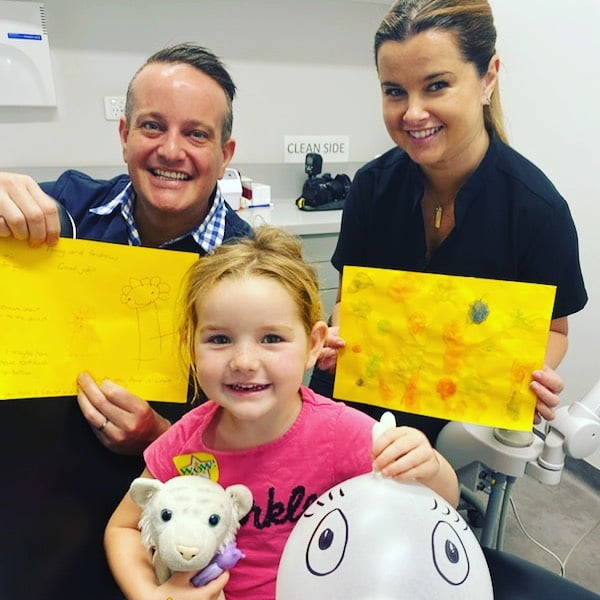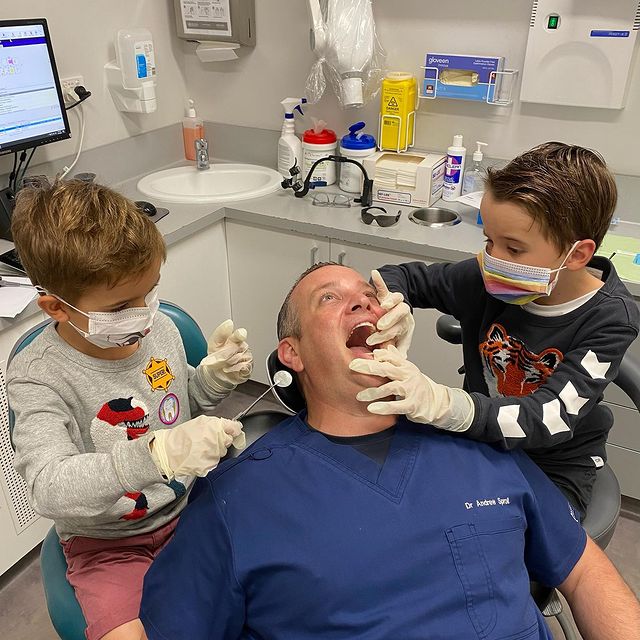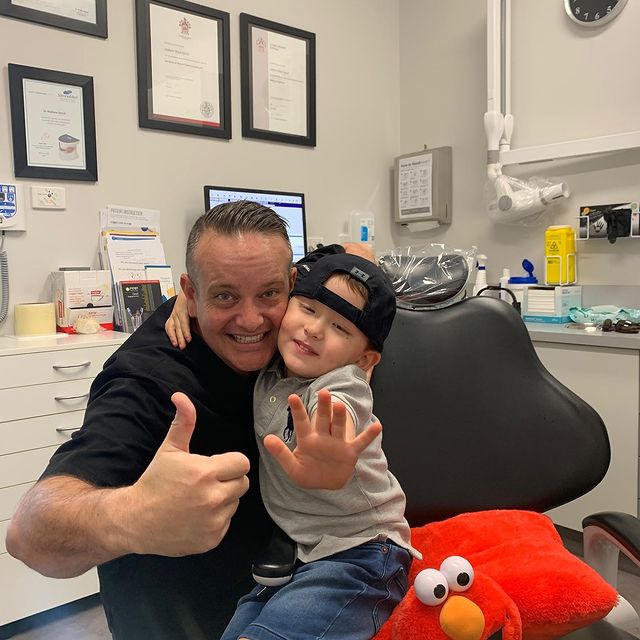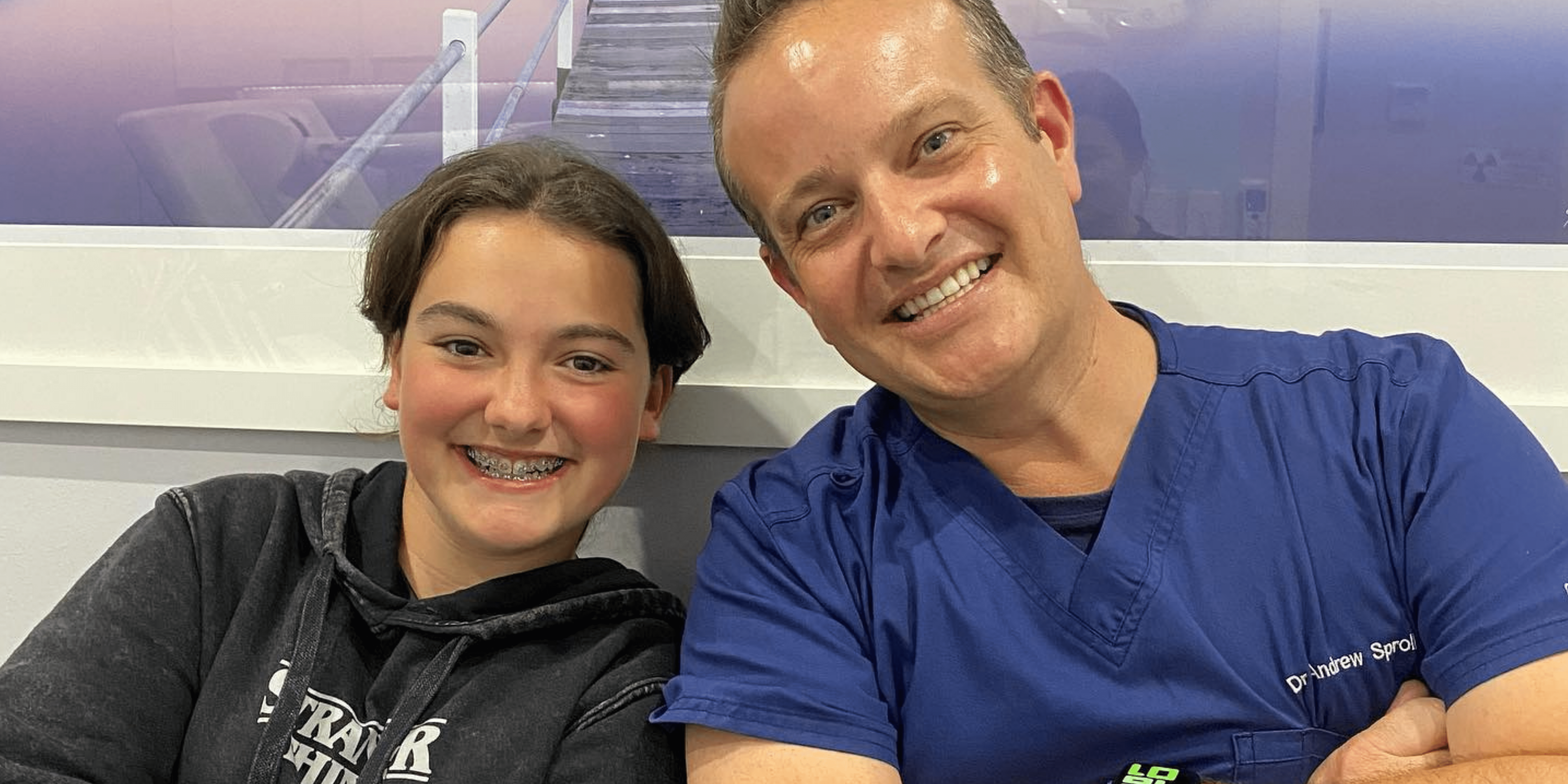Most people remember their first time going to the dentist and we know that many first-time experiences are not great but we’re here to change that!
Going to the dentist shouldn’t be scary, not the first time or the hundredth time! Our gentle and personal approach at Empire Bay Dental to dentistry will ease any worries you have bringing the child to their first appointment.
Dr. Andrew Sproll (Principal Dentist and Co-owner) is our Lead Dentist in Children’s dentistry and Orthodontics. He maintains a special interest in these disciplines and provides comments below on the child/children’s visit to the dentist. All our practitioners at Empire Bay Dental are trained to provide children’s dentistry in a comfortable and positive way.
Preparation tips for the child’s first or any visit:
- Our practitioners will guide you on how to act/behave as the parent during the visit. It is best for the parent(s) to remain calm, and quiet in the corner of the room. By showing your trust in us, the child will observe the parents/guardians trust, and therefore have more of a chance in experiencing a successful appointment. The practitioner will lead the appointment and engage the parent if required. The child is only capable of listening to one person at a time and that is the practitioner completing the appointment
- It is recommended for only one parent/guardian to enter the surgery with the child. The practitioner is always happy to discuss with another parent/guardian in the waiting area after the appointment has been completed. If other siblings are not receiving care at this appointment, it is best for them to not attend if possible, to avoid the child’s distraction. Too many people in the room is not conducive to a positive experience.
- Please avoid words or phrases leading up to the appointment e.g., hurt, needle, sharp, pain, scary, they will “rip” your tooth out etc. These comments are negative, not necessary, and not conducive to a positive appointment. These words/phrases often reflect the parents/guardians experience and by using these words/phrases before the appointment is not helpful and will shape the child’s thoughts (in a negative way) before they have even attended. Parents should not talk to their children about their own past experiences (especially if you have had a negative experience or have anxiety toward visiting the dentist).
- It’s recommended to not tell the child how or what to expect from the visit. Promising a child that nothing will happen, will only reinforce what they want to hear and sometimes, treatment or services may in fact be necessary at the appointment that the child is not prepared for.
- Parents should be positive and welcoming that the visit will be a good experience. Often, the dental appointment will be a good experience, and this is due to the fact that our dentists and hygienists are very experienced in treating children. We have multiple techniques to offer to the child to get through their appointment(s)
- According to Dr. Sproll, one of the best ways for a child to express their concerns is to have the child write down questions at home before they come. This way, time can be taken before starting any procedures, to address the concerns of this child. This is an important step as the child needs to be heard and the practitioner providing the care is the only person to be able to answer the concerns as they are the person delivering care.
- Dr. Sproll recommends appointments for treatment should be scheduled in the morning only. We don’t encourage that the child is at school thinking about the treatment appointment all day for their afternoon/after school treatment appointment. After a day at school, children are fatigued, non-compliant and ready to rest. Appointments late in the afternoon will likely lead to an unsuccessful appointment where they are not capable to complete the appointment. We understand that afternoon appointments are convenient, however, we support and encourage that services for children are based around what the child can commit to. When considering a treatment appointment, after school or after social events (e.g. soccer/ballet practice) are not recommended as children are tired and exhausted. This is not the time to schedule an appointment when attention/interaction & contribution of the child is required to get through the treatment appointment.
We want to ensure that the child/children receive not only the very best of care, but also have a positive experience that follows on in their dental journey. We aim to provide not only the child/children, but the whole family, a dental home where our practitioners are trusted by all.

When should you take the child for their first practitioner visit?
Most of the time, it’s best to take the child to see the practitioner for the first time when their first tooth becomes visible or when they reach 12 months of age, whichever comes first. While you might think it’s not necessary to book an appointment until the child has a full set of teeth, which is usually by the time they turn 3, the earlier the better as the key here is prevention. It is important for the child to have positive visits (rather than presenting in pain), where we are able to offer dietary and oral hygiene strategies before the risk of decay comes. Prevention is better than the cure!
If you have any concerns about the child’s teeth, or lack thereof, contact us and have a chat with our team about the options.
What to expect at the child’s first dental visit?
Usually, the child’s first visit to the practitioner involves the practitioner taking their full medical history, and possible discussions about:
- Teething and milestones of development
- Brushing techniques
- Bite (how the children’s teeth come together)
- Habits such as thumb/finger sucking
- Airway/breathing assessment
- The risk of decay and how to prevent it
- Prevention of traumatic injury to the child’s mouth
- Nutritional advice
It’s important to be positive about these visits and try not use the practitioner as a deterrent for bad behaviour such as not brushing teeth.

How to help at home
You should start caring for the child’s oral health from when they’re a baby and into their toddler years so by the time they reach around 3 years old, it has become a habit and they will know how to keep their teeth healthy. The national recommendation is for the parent to brush the child’s teeth until they can tie their shoelaces. This is the time that the manual dexterity to demonstrate brushing techniques effectively. Flossing should be started (again supervised) as soon as the teeth touch.
Do it together
Tooth brushing is an important part of our daily hygiene routine, and just like other habits, babies and toddlers learn as they become more independent. A great way to introduce little ones to tooth brushing is to do the activity together and even make a song about it. Parents and siblings can brush their teeth together with little ones.
It is important to note, though, that toothbrushes are tools and not toys, and that babies and toddlers should be closely supervised. Little ones can practice the motions of brushing their teeth, but ultimately an adult will need to brush properly.
Fluoride toothpaste is targeted to age groups, and therefore children MUST BE supervised at all times! NEVER let the child eat toothpaste. In large quantities, fluoride toothpaste can be harmful.
When measuring or dispensing toothpaste, whether a child or adult, the following must be observed:
- Amount of tooth paste onto the brush is only a “smear”
- The maximum amount of toothpaste id equivalent to the size of the brusher’s pinky fingernail.
- The current national recommendation for all ages is to spit the toothpaste out, DO NOT rinse off your teeth.
- Always drink tap water
Make it fun
Fun is the main ingredient to ensure that your kiddies enjoy looking after them! If they’re not having fun, try getting them a fun toothbrush! Get them a ‘Frozen’ toothbrush that plays “Let it Go” while they brush their teeth and watch them smile.
Get creative and make the brushing experience more about them, building their self- confidence, learning a new skill and being disciplined enough to carry out this task effectively on a daily basis. Learning can be fun and rewarding, enjoy it!
Practice Makes Perfect
Let’s face it – babies and toddlers are not always cooperative and there may be lots of other things a little one would rather do. We suggest using a “First this, then that” approach to encourage participation. For example, “First, we’ll brush our teeth, then we’ll play a game.” This way, the tooth brushing routine becomes a positive part of the day, followed by another fun experience!
It may take a bit of time but instilling the habit of looking after your teeth is one us adults didn’t all get taught. So be the change and help the child smile confidently for life!
One of the techniques adopted by our practitioners to provide treatment is “Tell-Show-Do”. This technique (as implied) is telling the child what you are going to do, show them, then do it. This technique is well researched and proven to be a great way to get the child to comply.
Worried about the cost?
Don’t be!
The Child Dental Benefits Schedule (CDBS) provides basic dental services to children aged between 2 and 17 years. Dental services are capped at $1000 over 2 consecutive calendar years. We DO NOT charge a gap payment from what Medicare pays.
The 2-year cap period starts when a child or teenager first gets an eligible dental service. A great way to assess whether you are eligible is to investigate this with Medicare before attending and let our receptionist know. We can also check online for you whilst you are visiting.
Healthfund with dental cover? We offer a check up, clean, x-rays and fluoride application for health fund only – this means you will not have a gap payment for the consultation
We have no healthfund and not eligible to clam the CDBS (Medicare)… We cap the check-up, clean, x-rays and fluoride application to $150.00
So, what are you waiting for? Book the child’s appointment at Empire Bay Dental today!

